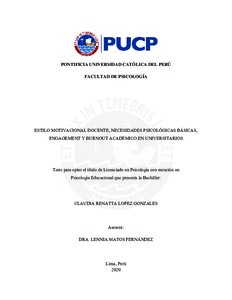Estilo motivacional docente, necesidades psicológicas básicas, engagement y burnout académico en universitarios
Abstract
Basado en la Teoría de la Autodeterminación, el objetivo de la presente investigación fue
examinar las relaciones entre el estilo motivacional docente que percibe el estudiante (apoyo
a la autonomía y control psicológico), la satisfacción y frustración de las necesidades
psicológicas básicas, el burnout y el engagement académico. La muestra estuvo compuesta
por 252 estudiantes de los dos primeros años de formación de una universidad privada de
Lima. Los instrumentos utilizados para la medición de los constructos fueron el Cuestionario
de Clima de Aprendizaje, el Cuestionario de Control Psicológico Docente, la Escala de
Satisfacción y Frustración de Necesidades Psicológicas Básicas, la Escala Maslach Burnout
Inventory Students Survey (MBI-SS) y la Escala Utrecht Work Engagement Scale for
Students (UWES-S-9). Los instrumentos presentaron adecuadas evidencias de validez y
confiabilidad en la muestra. El análisis de senderos encontró que el estilo motivacional
docente de apoyo a la autonomía se relaciona de manera significativa y positiva con el
engagement académico mediado por la satisfacción de las necesidades psicológicas básicas
de los estudiantes. Por otra parte, halló la relación positivamente significativa entre el estilo
motivacional docente de control psicológico y el burnout académico mediado por la
frustración de las necesidades psicológicas básicas de los estudiantes. Además, encontró la
relación negativa entre la satisfacción de las necesidades psicológicas básicas y el burnout
académico, asimismo la relación negativa entre la frustración de las necesidades psicológicas
básicas y el engagement académico. Los resultados fueron discutidos y se plantearon
recomendaciones a partir de los hallazgos. Based on Self-Determination Theory, the aim of the present study was to examine the
relationships between the motivational teaching style perceived by the student (autonomysupportive
and psychological control), satisfaction and frustration of basic psychological
needs, academic burnout and academic engagement. The sample was composed of 252
students of the two first years from a private university in Lima. The instruments used for the
measurement of the constructs were the Learning Climate Questionnaire, the Psychologically
Controlling Teaching Questionnaire, the Basic Psychological Need Satisfaction and
Frustration Scale, the Maslach Burnout Inventory Students Survey (MBI-SS) and the Utrecht
Work Engagement Scale for Students (UWES-S-9). The instruments presented optimum
evidences of validity and reliability in the sample. The path analysis found that the
motivational teaching style of autonomy-supportive is significantly and positively related to
academic engagement mediated by the satisfaction of basic psychological needs of the
students. On the other hand, was found the positively significant relationship between the
motivational teaching style of psychological control and the academic burnout mediated by
the frustration of the basic psychological needs of the students. In addition, was found the
negative relationship between the satisfaction of basic psychological needs and academic
burnout, as well as the negative relationship between the frustration of basic psychological
needs and academic engagement. The results were discussed and the recommendations were
made based on the findings.
Temas
Stress (Psicología)
Educación superior--Aspectos psicológicos
Estudiantes universitarios--Investigaciones
Motivación (Educación)
Educación superior--Aspectos psicológicos
Estudiantes universitarios--Investigaciones
Motivación (Educación)
Para optar el título de
Licenciado en Psicología con mención en Psicología Educacional
The following license files are associated with this item:






